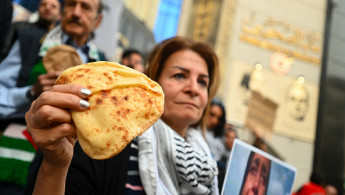After charging them with terrorism-related activities, Egyptian authorities release 14 pro-Gaza activists
An Egyptian state security prosecutor ordered the release of 14 activists on Sunday, 7 April, a few days after they were in custody pending terrorism-related charges over joining a pro-Gaza protest held earlier last week in the capital, Cairo.
The activists, including men and women, detained late on Wednesday, 3 April, and in the early hours of the following day, were accused of "disseminating false news" and "joining a terrorist group," among several other charges.
Prominent human rights lawyer Nabeh Elganadi posted on his Facebook page that they have been released without elaborating further.
Some of the detainees claimed to have been subjected to maltreatment and physical abuse by the authorities in detention, the lawyer added.
Conflicting reports over the past few days have marred the exact number of released activists, but the most recent ones put it at 14.
It remains unclear whether the charges against them were dropped or if they were released pending trial or further investigations, as their legal status has not yet been declared.
Elganadi could not be reached for comment by The New Arab at the time of publication.
The detentions are believed to have been triggered by slogans the activists in question shouted against the regime and figures linked to it clouded by allegations of corruption related to the situation of the Palestinian refugees who fled Gaza.
Marking 180 days of the Israeli attack against the Palestinian Gaza Strip, hundreds of activists and journalists during last week's protest, held outside the Journalists' Syndicate headquarters in Cairo, slammed what they described as "the inaction of Arab leaders" against Israel, which has killed over 33,000 Palestinians in Gaza Strip.
Over the past weeks, similar protests were held in the same spot in the form of symbolic Ramadan Iftar when protesters only broke their fast with bread and water to protest the starvation of Palestinians in Gaza.
Palestinians in Gaza are facing the threat of famine and have severely restricted access to healthcare. Many people, mostly children and infants, have died of hunger.
Since the Israeli war on Gaza erupted on 7 October last year, Egypt has frequently been criticised for only allowing critical cases and foreign and dual nationals to enter the country from the besieged coastal enclave as the brutal war on the Strip continues.
No official statistics have been made public about the exact number of Palestinians who crossed into Egypt since the offensive broke out.
Egypt, the first Arab country to sign a peace treaty with Israel in 1979, is currently among the few parties talking to both sides as a critical mediator.





 Follow the Middle East's top stories in English at The New Arab on Google News
Follow the Middle East's top stories in English at The New Arab on Google News


